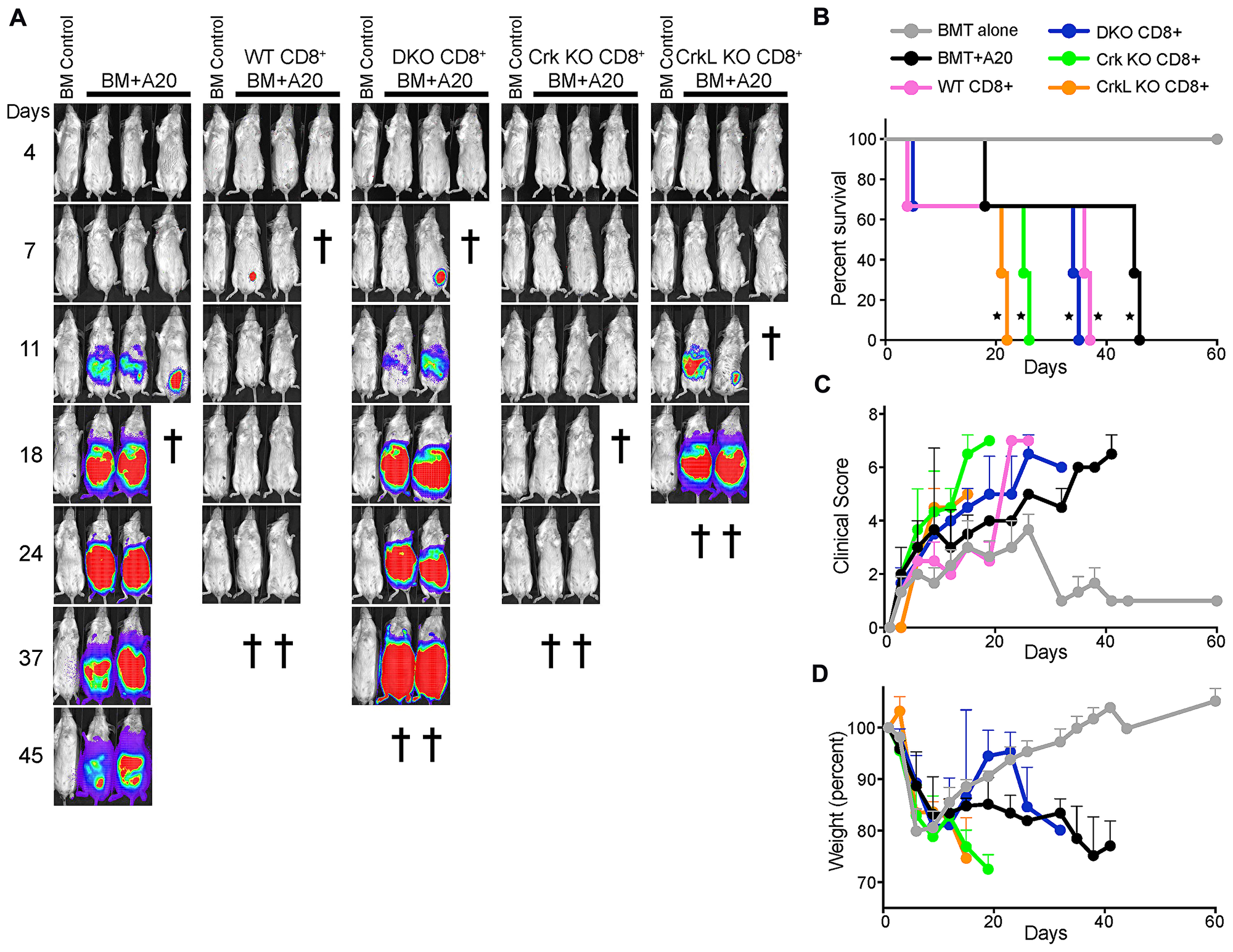Oncotarget: CrkL is required for donor T cell migration to GvHD target organs
FOR IMMEDIATE RELEASE
2021-11-19
Oncotarget published "CrkL is required for donor T cell migration to GvHD target organs" which reported that the success of cancer therapies based on allogeneic hematopoietic stem cell transplant relies on the ability to separate graft-versus-host disease from graft-versus-tumor responses.
In vitro, CrkL-deficient T cells fail to polymerize actin in response to the integrin ligand ICAM-1, resulting in defective migration. In line with this, these authors found that although CrkL-deficient T cells could clear hematopoietic tumors, they failed to clear the same tumor growing subcutaneously, highlighting the role of CrkL in controlling T cell migration into peripheral tissues.
Dr. Mobin Karimi from The SUNY Upstate Medical University said, "T cell migration out of the vasculature into peripheral tissue is a key control point in the inflammatory response."
T cell migration out of the vasculature into peripheral tissue is a key control point in the inflammatory response.
Although trafficking to tissues is required for protective immunity, uncontrolled T cell infiltration into tissue can result in exacerbated inflammation and tissue damage. T cell recruitment is highly regulated by the local endothelial cells which, in response to pro-inflammatory cues, up-regulate molecules such as chemokines and adhesion receptors. These molecules promote T cell adhesion to the endothelial monolayer, and guide migration through the monolayer into the tissue.
Activated T cells lacking Crk proteins fail to polymerize actin downstream of LFA-1, and migrate slower and less directionally than their WT counterparts. Importantly, these mutant T cells also have defects in crossing endothelial monolayers in vitro, and they fail to traffic to sites of inflammation in vivo.
Additionally, using a clinically relevant mouse model of graft-versus-host disease/graft-versus-leukemia, these authors showed that T cells lacking Crk proteins can efficiently clear tumor cells but cause little-to-no GvHD pathology. The Crk proteins are widely expressed across tissues and have many biological functions, all of which stem from their role as adaptor proteins that coordinate signaling complexes downstream of cell surface receptors.

Figure 4: T cells lacking CrkL fail to eliminate a subcutaneous tumor. Lethally irradiated BALB/c mice served as recipients in this subcutaneous tumor model. As a control, irradiated mice were injected intravenously with T cell depleted C57BL/6 bone marrow alone (BM control). For experimental groups, in addition to receiving T cell depleted C57BL/6 bone marrow, irradiated mice were injected subcutaneously with A20 lymphoma cells expressing luciferase (BM+A20) with or without intravenously injected CD8+ T cells from WT, DKO, CrkI/II KO, or CrkL KO mice. (A) Over the next several weeks, the mice were periodically injected with luciferin and imaged to visualize tumor burden. The cross symbols represent when each individual mouse was sacrificed based on either tumor burden or severe GvHD. (B–D) Quantification of clinical data from the mice shown in panel A. (B) Overall survival (*p < 0.05, Wilcoxon test), (C) clinical score, and (D) mouse weights. One representative experiment of n = 3 experiments, with 7mice per group per experiment.
Crk proteins are particularly important for adhesion and migration. They have been shown to localize to adhesion sites and regulate the stability of these structures in non-hematopoietic cells, and alterations in their expression are associated with invasive potential in several tumors.
The Karimi Research Team concluded in their Oncotarget Research Output, "Going forward, it will be interesting to identify CrkL binding partners and other signaling molecules needed for integrin-dependent actin responses and passage into inflamed tissues. Targeting these molecules could be used to more finely control T cell trafficking in the treatment of inflammatory diseases and for the design of next-generation adoptive T cell therapies."
Sign up for free Altmetric alerts about this article
DOI - https://doi.org/10.18632/oncotarget.27509
Full text - https://www.oncotarget.com/article/27509/text/
Correspondence to - Mobin Karimi - karimim@upstate.edu
Keywords - graft-versus-host disease, CrkL, T cell, migration, inflammation
About Oncotarget
Oncotarget is a biweekly, peer-reviewed, open access biomedical journal covering research on all aspects of oncology.
To learn more about Oncotarget, please visit https://www.oncotarget.com or connect with:
SoundCloud - https://soundcloud.com/oncotarget
Facebook - https://www.facebook.com/Oncotarget/
Twitter - https://twitter.com/oncotarget
LinkedIn - https://www.linkedin.com/company/oncotarget
Pinterest - https://www.pinterest.com/oncotarget/
Reddit - https://www.reddit.com/user/Oncotarget/
Oncotarget is published by Impact Journals, LLC please visit https://www.ImpactJournals.com or connect with @ImpactJrnls
Media Contact
MEDIA@IMPACTJOURNALS.COM
18009220957x105
Copyright © 2025 Rapamycin Press LLC dba Impact Journals




